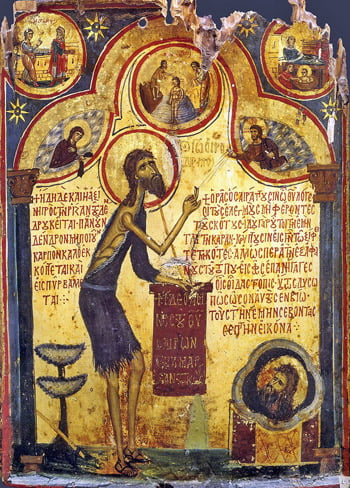The Second Sunday of Advent opens with the cry of John the Baptist out of the wilderness: ‘Prepare the Way’. This cry is intended to pierce our hearts so that we may be ready for the new unfolding life of ‘the God who is to come’. As we live into the hope of God’s gift that is coming, we are not to be lax in our preparation. We are to do whatever is needed to prepare our hearts to receive what is coming. The hardened heart cannot receive the gift. The heart that refuses to forgive or to offer compassion is not ready to receive what is to come. The voice of the Baptist crying in the wilderness is one of ‘repentance’. While we are not in Lent still this strong call to repentance is fitting for Advent: it is a call to turn from our ‘old’ ways of acting and responding. Turn away from that old tape, that same old way of responding and turn towards the new that is coming to bring life and healing…with the advent of Christ comes the ‘new wine that asks for new skins’! Will we be prepared to receive this gift? Will we keep in mind that our preparation, which includes ‘repentance’, is to help us receive the Word with ‘new skins’? We are to clear the inner channels so that they are open to receive the Coming One.
Without leaving the theme of John the Baptist’s call to ‘prepare the way’, I like to return to the text of Jean Danielou that I referred to last Sunday for the opening of Advent: “The Christian does not have to break free from time in order to enter eternity…but is rather required to assume a state of waiting for the entry of eternity into time…”(Prayer, p.33). We do not have to break free from ‘time’ to encounter our God…We wait in time…we prepare in time…we stay awake and listen with the inner poetic sense that we all have. The sixth century Rule of St. Benedict opens with the words ‘listen with the ear of the heart’. Poets, artists, musicians (if they are good!) along with monks are all to listen with the ‘ear of the heart’ for this is how they receive the creative gift, the gift of God’s enduring and prophetic life longing to be made visible through our lives. ‘Listening with the ear of the heart’ is what we all are called to do. For it is this poetic or monastic inner sense that hears, feels, is able to apprehend the entrance of the ‘eternal’ into the historic moment that we are living in. Christ is coming again into our historical time and he will not delay. We only have to assume an interior state of waiting: empty, free of the old blocks and negative, fear filled voices, dwelling in the silence, listening with our poetic sensitivity for the in- breaking of the eternal Word into our humble, waiting flesh.
The eternal dwelling in time, God born in a humble stable, the human and Divine encounter one another in the mystery of Love, all creation glows with the sparks of God’s life, darkness ushers forth Divine light, the Word breathes with our very breath saying: ‘Do not be afraid, I will be with you even more now’. He is coming and breathes with our breath, the small still voice of the Spirit is hovering over our expectant lives: let us be ready and open, heeding the Baptist’s cry to repentance, choosing the movement of faith, to turn from whatever it is that needs change….and to turn towards the One who is coming with the ‘new wine’ of hope, peace and love. And let us, in the words of Bernard of Clairvaux: ‘Enter the inner room of the heart, straining to listen with the poetic sense to the tidings of God’s messenger’ for these tidings are bringing the ‘new wine’ of Divine life.


